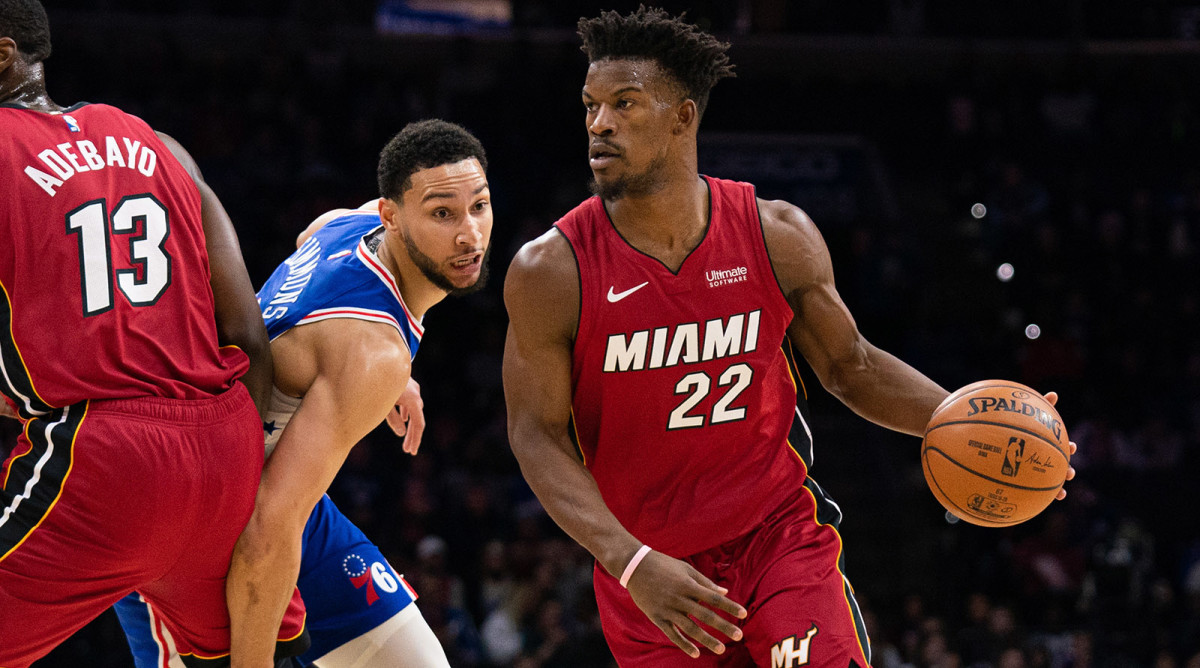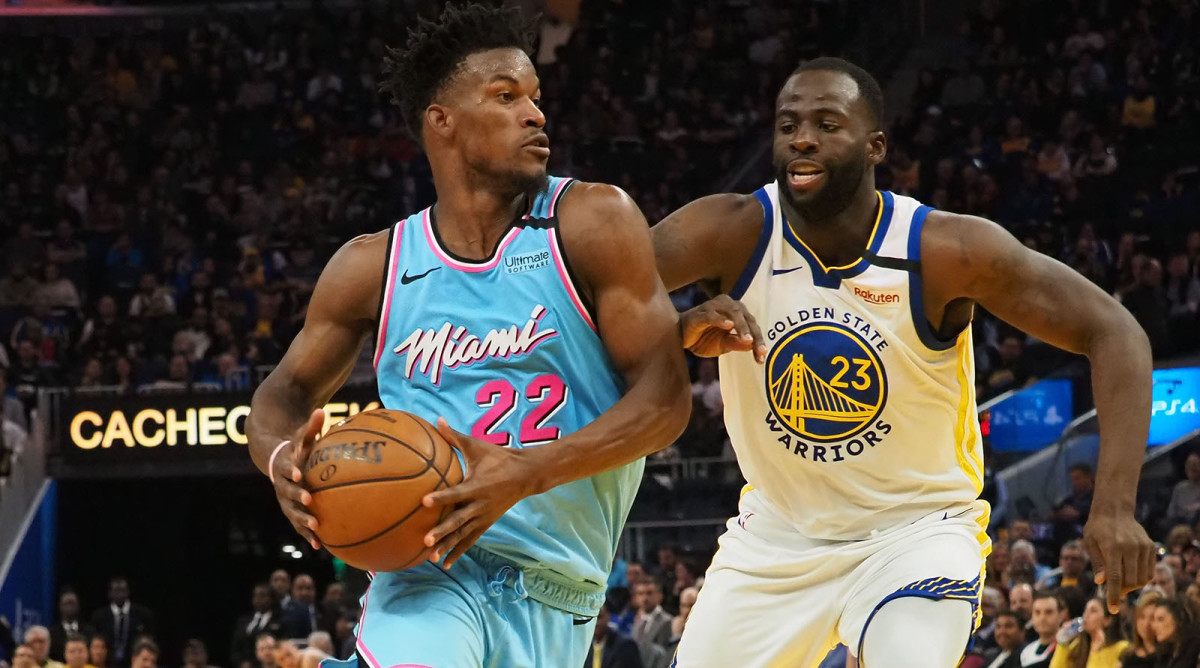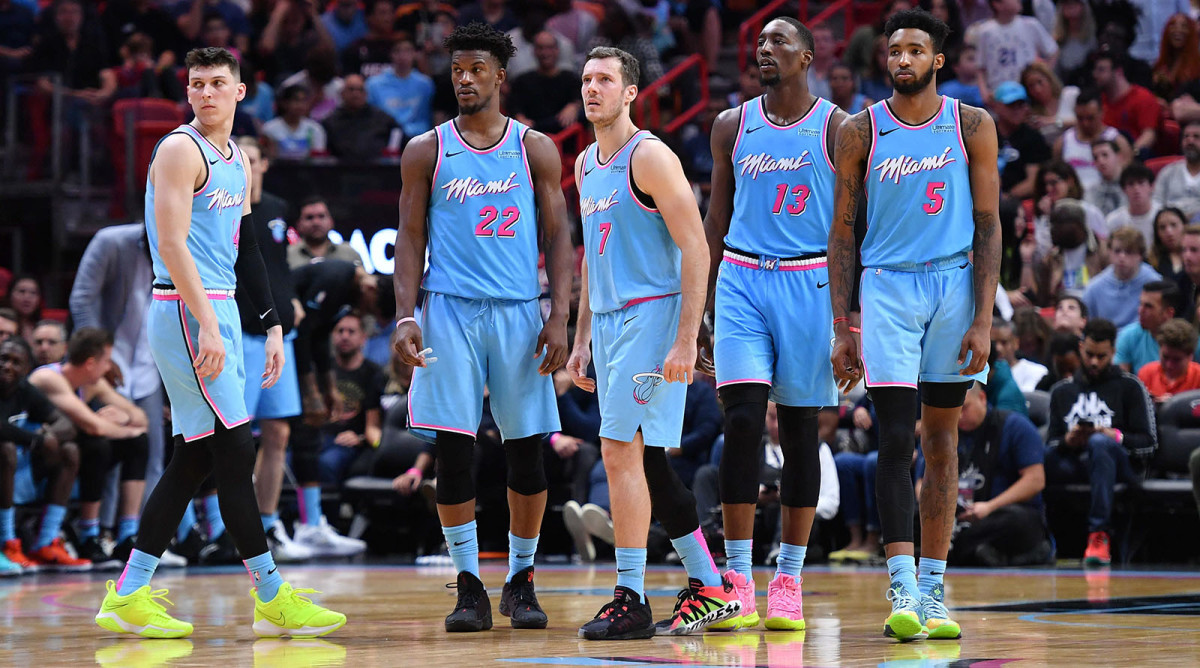Inside Jimmy Butler's Fresh Start With the Miami Heat

Before the season began, Jimmy Butler was asked about podcasts. Specifically, he was asked about podcast hosts who, at the height of NBA free agency last summer, couldn’t understand his decision to leave two All-Stars on the 76ers and engineer a sign-and-trade to a Heat team that won 39 games a year ago.
Wasn't this the same guy who forced his way out of Minnesota because he wanted to play for a title contender? Isn’t that exactly what he was leaving in Philadelphia? Half the league’s superstars spent the summer forming strategic alliances to chase championships, but perhaps Butler cared more about being the man in Miami than playing a supporting role for a contender in Philly. Or maybe the decision was proof that a ring was never his primary motivation. The only thing that mattered was which team would offer him the most money and the longest contract as he approached his 30th birthday.
Butler responded to all these paraphrased takes with a laugh. Then he said exactly the sort of thing you might expect Jimmy Butler to say at this point in his career: “They can kiss my ass. You’re entitled to your opinion, but stay on the radio. You know, everybody’s big and bad on the internet. That’s O.K. The group of guys that we got, we’re gonna win. We’re gonna be fine. All I ask is that you keep that same energy when it’s like, ‘Ohhhh, [the Heat are] surprising all these people.’ Nope. I want you to still say that Jimmy made the wrong choice and their team is terrible.”
Good luck finding anyone making those arguments today. July was a long time ago and the Heat have been steady all season long. As the All-Star break approached, Miami was in fourth place, 22-3 at home, and poised to push every other contender in the East. Surprising or not, this has been one of the best stories in the NBA.
Among the highlights so far: the emergence of a 22-year-old big man who looks like he’ll be a perennial All-Star (center Bam Adebayo), the breakout performance of the 13th pick in last June’s draft (shooting guard Tyler Herro), reliably excellent coaching (Erik Spoelstra) and a deep reservoir of versatile rotation players who seem to alternate big games every other night. The formula has given rise to a team that’s not quite great, but clearly very good, and one of most entertaining watches in the league. In wake of the trade deadline earlier this month, Andre Iguodala and Jae Crowder have joined the rotation for the stretch run.
At the center, there's Butler. Through 46 games he was averaging 20.6 points, 6.8 rebounds and 6.1 assists. His shooting numbers have been down (24.8% from three) but as a 6'7" point forward his assist numbers are a career high, and he provides the sort of rugged offense (9.2 free throws per game) that gives Miami an insurance policy when everything else breaks down.
In general, he’s been doing a little bit of everything to help good, young players win games they had been losing the past two years. Per Basketball Reference, the Heat's net rating has been 6.7 points better with Butler on the floor this season. As Spoelstra said, “There’s a reason we chased him so hard and backed up the Brink’s truck. We have a guy that we believe can take us to a different level.”
Adebayo has been sold since the first week of training camp. "That's when you start to figure out how good a team can be," he says. "Jimmy wasn’t really shooting the ball as much. He was getting people involved. A lot of guys use preseason to get their groove on, get that confidence up. But he used it to get his teammates involved. He’s that type of guy.”
Says Herro, “The first day, five-on-five, he was already talking crazy to other players. Like, ‘This is what I expect. No matter whether it’s the summer, or whenever it is.’ That set the tone for the whole group, for the whole year.”

Butler’s first All-Star appearance came in 2015, back when he was with the Bulls. He was 25. Between the recognition from his peers and the celebrities who all seemed to know his name, Butler says that those 72 hours in New York City were the first time he allowed for the possibility that he might be a star. “Not in a million years did I ever think I’d be having a convo with Rihanna,” he says. “Or sitting next to Ludacris, talking to Kevin Hart. It was legit crazy to me. A kid from Tomball, Texas. It’s surreal to this day.”
More recently, Butler has been best known for the rumors that have followed him around the league. The Heat are his fourth team in as many seasons. When he landed with Miami this summer, his new teammates weren’t sure what to expect. “I didn’t really know him,” Adebayo says. “So you just look at the news. It made Jimmy look like a bad dude. Like an a------, honestly.”
“When he first signed,” Herro says, “my friends were like, ‘Do you think you’ll be able to get along with him?’”
Butler, now 30, is honest about the chip on his shoulder early in his career. “Not everybody’s out to get you,” he says. “You got genuine, good people in the world. Now I’m not going to say that everybody’s a legit, great human being. But people care about you. Not everybody wants something from you. I wish I would have known that five years ago.”
At the same time, he’s still not sure why he deserves blame for the failed chemistry experiments elsewhere. “Get your ass up with me and come train at 5,” he says. “You’ll be pissed off when other people don’t do what they need to do to be great. You’ll be pissed off, too.”
If anything, he has a sense of humor about his combative reputation. When asked to reflect on a 12-month span that included seven or eight controversies that landed him at the center of the sport, he responds before the question is finished. “Really?!” he says, grinning. “Eight?! I’m not that f------ crazy, man.”
He demands that each incident be listed, so, in chronological order: the four-team sign-and-trade he instigated last summer in Philly; two or three days of rumors that he might land in Houston with James Harden; a reported confrontation with coaches barely a month into his stint with the Sixers; a Timberwolves practice in which he berated the starters while playing against them with a group of third-stringers; the initial trade demand from Minnesota . . . “No!” he says. “Come on. The trade demand and the practice, that should count as one!”
He’s laughing now. So, O.K., fine, eight controversies may have been overstating it. Nevertheless, Butler concedes, “A lot did go on, now that I think about it. That s---’s so far behind me, though. If you’re not there, you really don’t know what’s going on, you really don't know what happened. I know what happened.”
He points to a friend sitting across the room. “If he steps on my toe and I go, ‘You motherf-----! What the f--- is wrong with you?!’ You don’t know that he stepped on my toe, but somebody will say, ‘Whoa, he called him a motherf----.’ Then it becomes, ‘Oh, what an a------.’ ”
Butler lets out an exaggerated sigh. “Well the motherf---- stepped on my toe. You didn’t get that part!”
That hypothetical is included here both for its intended point—Butler feels that media reporting on him has lacked context—and for its unintended point: he is the type of person who might accost you for stepping on his toe. Not everyone in a workplace will react warmly to that sort of personality. For that matter, while Butler sets high standards for teammates and works incredibly hard, he also works hard to tell you how hard he’s worked. The combination can be grating. In Chicago, GM John Paxson and coach Fred Hoiberg bristled. So did Andrew Wiggins and Karl-Anthony Towns with the T-Wolves.
One rumor Butler would like to dispel is the idea that he left Philadelphia because of tension with Ben Simmons or Joel Embiid. “I didn’t have a problem with either one of them,” he says. “Still talk to those dudes. I wish them the absolute best. A career of great health, make as much money as you can, win as many championships as you can. I did not have a problem with any of those guys. It just didn’t work the way that we wanted it to work. That’s life. Not everything pans out the way you want it to pan out. But you learn and you move on from it.”
Butler isn’t interested in elaborating on what, exactly, didn’t work. Likewise, asked whether he would still be in Philadelphia if the Sixers had offered him a five-year, $190 million contract in July, he says, “Nobody knows what was offered and what was said. You only know what the media told you.”
What’s indisputable is that he’s in Miami seven months later—and the Heat have a better record than the 76ers.

Butler didn’t arrive to the NBA with the blue-chip pedigree of LeBron James or the genes of Steph Curry or Klay Thompson. He grew up in Tomball, a town of 10,753 outside Houston. He left his mother’s home at 13 years old and slept on spare couches through his teenage years. He went from being a kid who didn’t even play AAU ball to junior college to Marquette to the second round, and eventually to the center of the NBA. He doesn’t like talking about that past, but occasionally he alludes to it. “You gotta go further into my life,” Butler says at one point, “to understand why I am the way that I am. And I ain’t changing.
“I’m not a god-given talent. I ain’t the best shooter. I’m not the best ballhandler. Not the most athletic. Not the fastest. But I battle. I fight. I’m tough as s--- and I don’t back down. There goes my talent for you. I ain’t scared of nobody. Can’t scare me.”
The appraisal above could just as easily be a quote from Pat Riley. At the very least it’s the sort of aspirational koan that the Heat might paint on the wall of an AmericanAirlines Arena hallway. After all, this is the organization infamous for regularly measuring players’ body fat and cultivating an almost monastic belief in the virtues of conditioning. Riley has spent several decades telling the world he wants the Heat to be the “hardest-working, best-conditioned, most professional, unselfish, toughest, meanest, nastiest team in the NBA.”
In that respect, it isn’t the least bit surprising that Butler recognized kindred spirits when he began talking to Miami’s front office this summer. “The culture they have here just fits me,” he says. “That’s what [this summer’s decision] came down to. You can talk about the state tax, you can say that the sun is out. Say whatever you want to say. But the way that they work, it welcomes me. It embraces me. Because in order to thrive here, you gotta have a crazy-ass work ethic. And it’s not for everybody. Spo wears a shirt, it literally says, this isn’t for everybody. And it’s not. But it’s for me.”
His teammates agree. “When I really got to know him,” Adebayo says, “I was like, 'He's not an a------ at all!' He just holds himself to a high standard, so he wants to hold his teammates to a high standard. That's a big reason he's helping. He fits us. He's a Heat guy.”
Herro sought out Butler soon after both joined the Heat this summer. They eventually trained together in Chicago, at 5 a.m., on the beach by Lake Michigan. That’s where Butler and his performance coach, James Scott, introduced Herro to Monster Ball, a game in which two teams of two take to a volleyball court. One side throws a 10-pound medicine ball over the net, and once an opponent catches it, he has to hurl it back over the net from that same spot on the court. Each game lasts to 10, and play continues until one side wins seven games. A Monster Ball session generally lasts between 60 and 90 minutes.
If those sessions were a test, Herro passed. And on this point, Butler offers what might be the best teammate endorsement of the season: “He really good. He’s a weird little s---. All that stuff he wears, bandannas and all that. That’s my dog, but I told him he gotta cut that s--- out. I like him, man. And he works. He smiles when it’s time to smile, but when it’s winning time, he’s got a straight mean mug. Like, ‘I will f------ eat you.’”
Hearing Butler’s assessment, the rookie stifles a laugh. “That sounds like something Jimmy would say,” Herro says. “I would say he’s weird, too.”

Butler’s predawn-workout persona can verge on self-parody, but he's at least aware of how ridiculous he can sound. Both Herro and Adebayo say that he is routinely hilarious, and unlike many NBA superstars, he’s capable of laughing at himself. It’s a quality that shines through when he names the book he loved this summer (“The Subtle Art of Not Giving a F---. It sounds like something my dumb ass would read”), discusses his fashion plans in Miami (“I’m gonna be wearing mink coats, sweating my balls off”), or laments his lack of mobility walking the streets of his new home (“I got this dumbass hairdo that everybody recognizes”).
It’s fair to wonder whether Butler’s brand of merrily psychotic leadership will become less charming if the Heat face adversity. Likewise, Butler is a superstar when he’s healthy, but he’s averaged just 66.4 games over the past five seasons. Two years ago in Minnesota, an All-NBA season was cut short by knee surgery. As he enters his 30s in the first year of a four-year max deal, Butler’s durability and athleticism will both be worth monitoring.
For now, no one could have asked for a better start. As often as we stress the importance of context and opportunity in evaluating young players across the NBA, Butler in Miami is proof that the caveats extend to superstars just the same. This season he has responsibilities he wouldn’t have been afforded in Philadelphia, he’s surrounded by players and coaches who celebrate the intensity that made him polarizing elsewhere, and suddenly he looks like a franchise cornerstone again.
Adebayo credits Butler for constantly pushing him to expand his game beyond the responsibilities of a traditional center. Do more, do more, do more is Butler’s refrain. Adebayo has responded by blossoming into one of the most versatile big men in the league. With double-digit rebounding, high-post passing, and the mobility of a guard on defense, he is the east coast’s answer to Draymond Green. He’s given the Heat a second building block for the present, and a potential superstar in the future.
Butler’s contributions vary by the game. Some nights he is content to play game-manager while teammates flourish (14 points on 11 shots in a December win over the Sixers), others he is a scorer (38 points on 14-20 shooting to rout the Sixers in February), and then there are games in which Butler does a little bit of everything and methodically grinds his way through entire teams (22 points, 13 rebounds, 12 assists to beat the Raptors on the road). Says Adebayo, “You want him to pass? He can pass. You want to defend? He can defend. You need to get a last-second shot off? Initiate the offense? He can do that. He’s willing to do whatever it takes.”
Through the first four months Butler, Adebayo and the Heat have already come far enough to begin thinking beyond the regular season. That alone is progress. They probably aren’t realistic title contenders, but there will be no battles for the eighth seed in Miami this spring. “We feel like we can win now,” says Herro. “That’s what we talk about. Every single day is just about getting better and preparing for the playoffs.”
Before the season, Butler took it a step further. “Truthfully,” he said, “I think we can compete for a championship. I do. And let me tell you why. Toronto was a really, really good team. With Kawhi, Pascal, K-Low... Really good team, right? Taking nothing from them, [but] the stars aligned for them. Unhealthy Warriors team. It happens. They capitalize on it. So if the stars align for us? Anything is possible. And I’m rocking with that. Nobody on this roster is scared of anybody.”
That absence of fear, and a collective ambition in Miami that isn’t entirely rational, is why this partnership always made sense. The truth about Butler and his career is that the qualities that have made him a complicated fit elsewhere—pride, intensity, compulsive defiance—are pretty clearly the same qualities that allowed him to climb from obscurity to the All-Star Game. For better and worse, this is a person whose switch is permanently flipped. Butler may promise that he won’t change, but it’s probably more accurate to write that he can’t change.
The news, this year, is that he found a team that prefers him exactly as he is.
